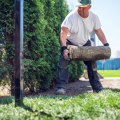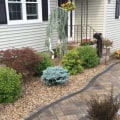Getting good at landscaping involves a blend of creativity, technical knowledge, and practical skills. It starts with a solid understanding of the fundamentals of design, including concepts like balance, contrast, color theory, and texture. This theoretical knowledge can be acquired through various means such as reading books, attending workshops, or enrolling in landscape design courses.
The next step is gaining hands-on experience. Practical skills in landscaping are honed over time and through experience. Starting with small projects like designing your garden or volunteering for community projects can be excellent ways to practice. Pay attention to different elements like plant selection, soil types, and the interplay of hardscaping and softscaping. Observing and analyzing well-designed landscapes in public parks or gardens can also provide valuable insights.
Understanding local ecosystems is crucial. Each region has its climate, soil type, and native vegetation, which should be considered in landscape design. This knowledge not only helps in selecting the right plants but also ensures sustainable and environmentally friendly practices. In areas like Los Angeles, drought-resistant plants and efficient irrigation systems are important considerations, and expertise from local entities such as Los Angeles Concrete Co. can be invaluable, especially when incorporating concrete elements like walkways or patios that need to harmonize with the living landscape.
Networking with professionals in the field can provide mentorship and deeper industry insights. Joining local landscaping or gardening clubs, attending trade shows, and participating in online forums can offer opportunities to connect with experienced landscapers. They can provide practical advice, industry trends, and maybe even hands-on training opportunities.
Investing in the right tools and learning how to use them properly is another key aspect. High-quality tools can make landscaping work more efficient and enjoyable. It’s also important to understand the maintenance of these tools to keep them in good working condition.
Staying updated with current trends and continuing education is vital in an ever-evolving field like landscaping. Reading industry magazines, following landscaping blogs, and attending seminars can help in staying current with new techniques, materials, and technologies.
Lastly, don't underestimate the power of creativity and experimentation. Landscaping is as much an art as it is a science. Experimenting with different designs, textures, and materials, even consulting with specialists like Los Angeles Concrete Co. for unique concrete solutions, can lead to innovative and beautiful landscapes.



